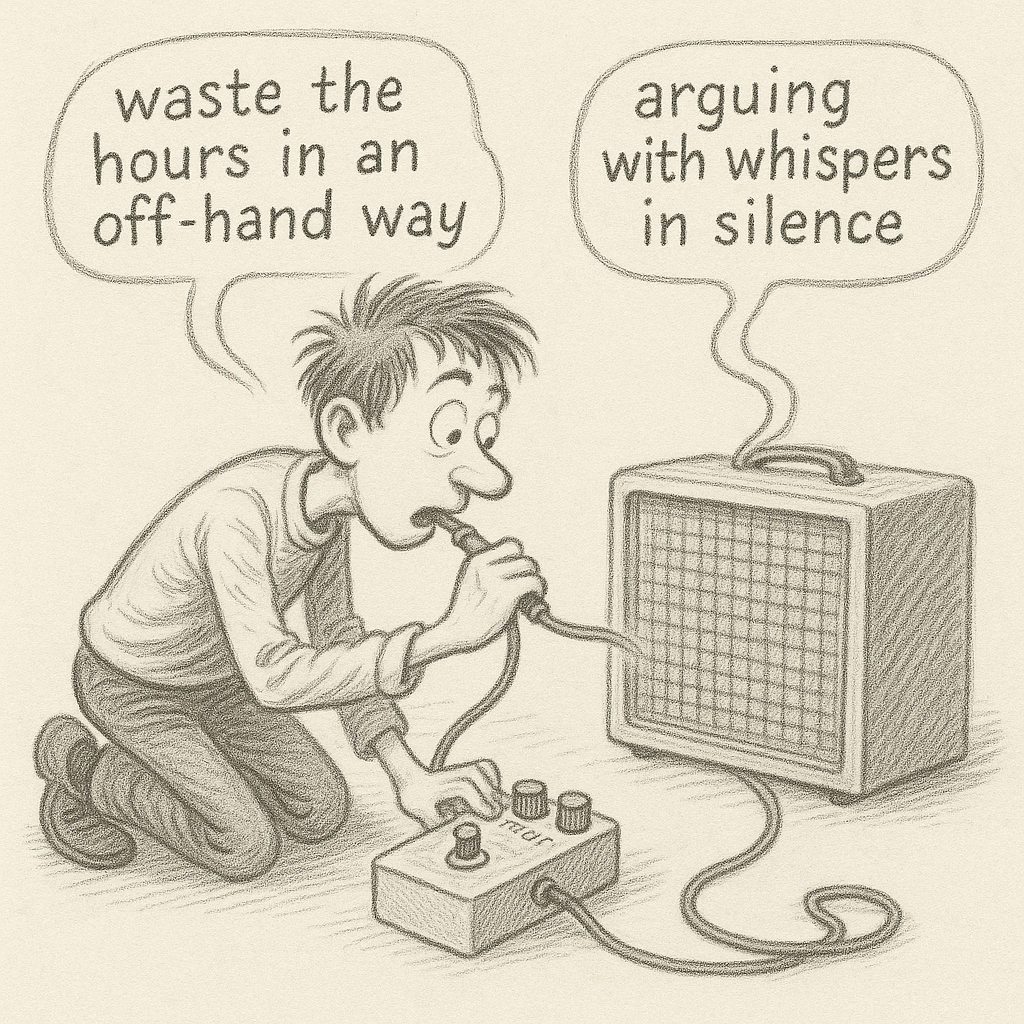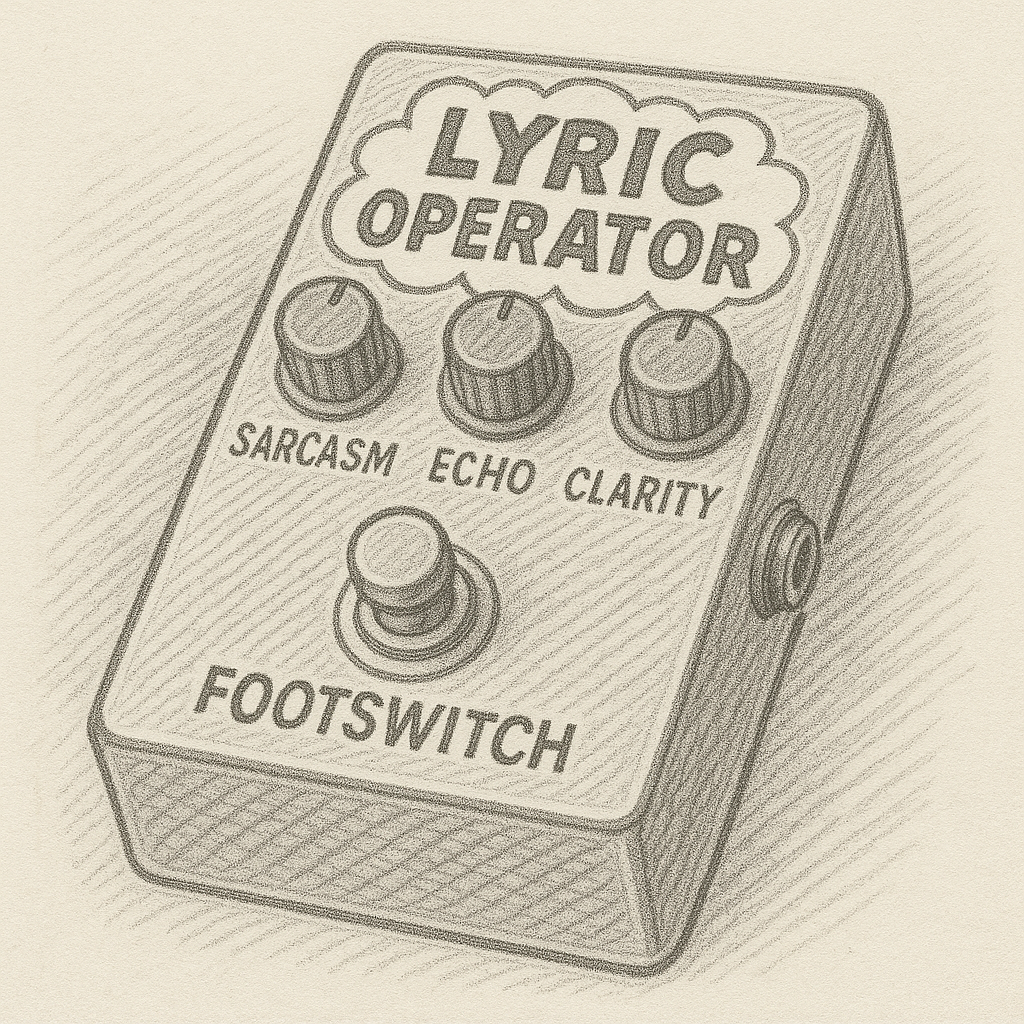What if we pushed lyrics through a series of noisy neural language transformations a la a distortion pedal

Guitar pedals transform signals in unpredictable and rewarding ways - could we do the same with lyrics? This idea occurred to me about 6 years ago when implementing a Naive Bayes classifier for text classification during my first computational statistics course. I said I would circle back -- well here I am.
Back.
Now I'm using large-scale transformer architectures instead of simple probabilistic models. And now I can just let Claude Code do simple development tasks in the background while I do laundry etc.

How It Works
Light Distortion applies sequential machine translation across multiple target languages. Each language exhibits distinct semantic constraints and syntactic structures, inducing gradual semantic drift with each translation step. Like running audio through a chain of signal processors.
Heavy Distortion first performs translation to a target language, then applies masked language modeling in that linguistic context, forcing the transformer to perform contextual inference within non-English semantic space. The text then continues through additional translation hops, accumulating both translation artifacts and language-specific idiomatic influences.
Example 1: Kitchen Light
A transformer model generated a simple test text exploring themes of domestic transgression
| Original | Light Distortion | Heavy Distortion |
|---|---|---|
|
Kitchen light spills yellow into the night The freezer door hangs open wide These small rebellions I've designed |
The kitchen is flooded with yellow light at night. The door of the freezer has been left open. My small act of resistance. |
The warm yellow glow of the kitchen light. The freezer door remains wide open. Those foods I have forgotten. |
The semantic drift is evident: "small rebellions I've designed" undergoes lexical formalization to "small act of resistance" (maintaining semantic coherence), then experiences complete conceptual divergence to "foods I have forgotten" (preserving only the spatial context while losing intentionality).
Example 2: Like a Rolling Stone (Verse 1)
Dylan's classic opening verse, increasingly scrambled.
| Original | Light Distortion | Heavy Distortion |
|---|---|---|
|
Once upon a time you dressed so fine Threw the bums a dime in your prime, didn't you? ... Like a complete unknown, like a rolling stone |
You used to be very chic, didn't you? At the peak of your time, you even threw 10 cents to beggars... Like a stranger, like a rolling stone |
You were once so well dressed You gave a ten-franc piece to the beggars... Like a boat without a rudder, like a rolling leaf |
My favorite transformation: "like a rolling stone" → "like a boat without a rudder, like a rolling leaf". The cascaded translation process generated novel metaphorical constructions that preserve the semantic essence of directionless motion while introducing a different idiom that has some fresh potential.
Try It Yourself
from pedalbored import language_chain, mutate_words_mask, AnthropicTranslator
# Light distortion
light = language_chain(
lyrics="Your text here",
languages=["French", "Japanese", "German"]
)
# Heavy distortion: translate first, then apply masked language modeling in target language
translator = AnthropicTranslator()
french_text = translator.translate("Your text here", "English", "French")
masked_french = mutate_words_mask(french_text, {"mask_probability": 0.6})
heavy = language_chain(
lyrics=masked_french,
languages=["Japanese", "German"], # Continue from French
translator=translator
)
Is This Useful?
Probably not. But neither are my 4 delay pedals. Sometimes you need your words to undergo a stochastic transformation through some GPUs in Oregon and return semantically altered man. One could optimize the outputs through prompt engineering, translation chain length, masking probability tuning, etc. and generate more compelling lyrical variations than what I've demonstrated.
In any case, I found I learned quite a bit about these models and the current API (including how to evade copyright violations).
